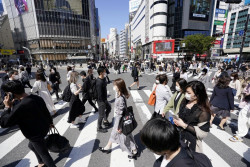
September 30, 2010
September 30, 2010
Originally published on metropolis.co.jp on September 2010 Japanese Healthcare While the Japanese system is definitely more cost-effective than the US system, and actually covers everyone, it too is dysfunctional in many ways. If you’re ever in a serious accident, there’s a good possibility that you’ll spend your last minutes in an ambulance while the driver […]
By Metropolis
Originally published on metropolis.co.jp on September 2010
Japanese Healthcare

Illustration by Eparama Tuibenau
While the Japanese system is definitely more cost-effective than the US system, and actually covers everyone, it too is dysfunctional in many ways. If you’re ever in a serious accident, there’s a good possibility that you’ll spend your last minutes in an ambulance while the driver frantically tries to find a hospital that will admit you and treat you. Hospitals here don’t want any trauma cases brought to them out of fear of having a death on their record. “Trauma” could include something as minor as severe heatstroke, as happened a couple of years ago to a high school student in my area who suffered dehydration during the school summer sports day. After collapsing, the school had an ambulance transport him to… where? Nowhere. They drove in circles, as hospital after hospital refused him admittance. He died en route.
If the Americans want to emulate a system that actually works, try emulating the Canadian system. More cost-effective than the US or Japanese systems, covers everyone and, comparatively speaking, few complaints. Compare it to your average HMO. Like comparing Attila the Hun to Mary Poppins.—johnnydinero
Yes, US medical care (and private expat insurance) is expensive, but I’ll take emergency rooms that are open 24 hours a day, qualified doctors who are willing to treat patients of any race/nationality, and current technology any day. I certainly haven’t had that experience here, with the exceptions of the highly qualified expat and worldly Japanese doctors that I’ve found at private clinics (the ones that don’t take national health insurance). Hats off to them. My hospital experiences here have been horrendous.
Yes, Japan has universal healthcare and yes, there is a focus on preventative medicine. That, however, is also independent of the legal regime that has been pushed in the US for so long by those of your political ilk. Perhaps if, and by way of example, ob/gyn doctors in the US weren’t spending six figures a year on malpractice insurance, there would be some hope of bringing down medical costs. Of course this was not addressed in the new legislation that was pushed through with little thought and less discourse. Yes, discourse (or as you call it “screaming and yelling”), something a healthy political system needs to thrive. Perhaps you could pay a visit to the Chinese Embassy so you can see real “screaming and yelling” from the Japanese nationalists. Oh wait, that doesn’t happen here, right, because there is no “turmoil” in Japan?—jt99
I could be a prick and accuse you of smoking crack, but I won’t, instead I’ll just state the facts. My wife and I recently had a child in Japan insured, which cost us over ¥750,000 (minus half for a rebate from the government), for her to stay in a crowded room with no bathroom. We had a child in the US and it cost less then a few hundred dollars total, in an immaculate hospital with plenty of amenities. So don’t even go there and suggest that the system here is in any way better. The system is so inferior that doctors have developed methods of milking money from the patients by having repeat visits. I think you should do a little more practical research in all areas of the system here before you bother to even suggest that it is superior. And what’s with targeting the US? Why not compare Japan with another flipping country? I’m sick of folks comparing the US and Japan. Find a new angle please, it’s boring.—pissdrunkpista
Metropolis wants to hear from you. To send your comments, . Note that letters may be edited for length and clarity.







